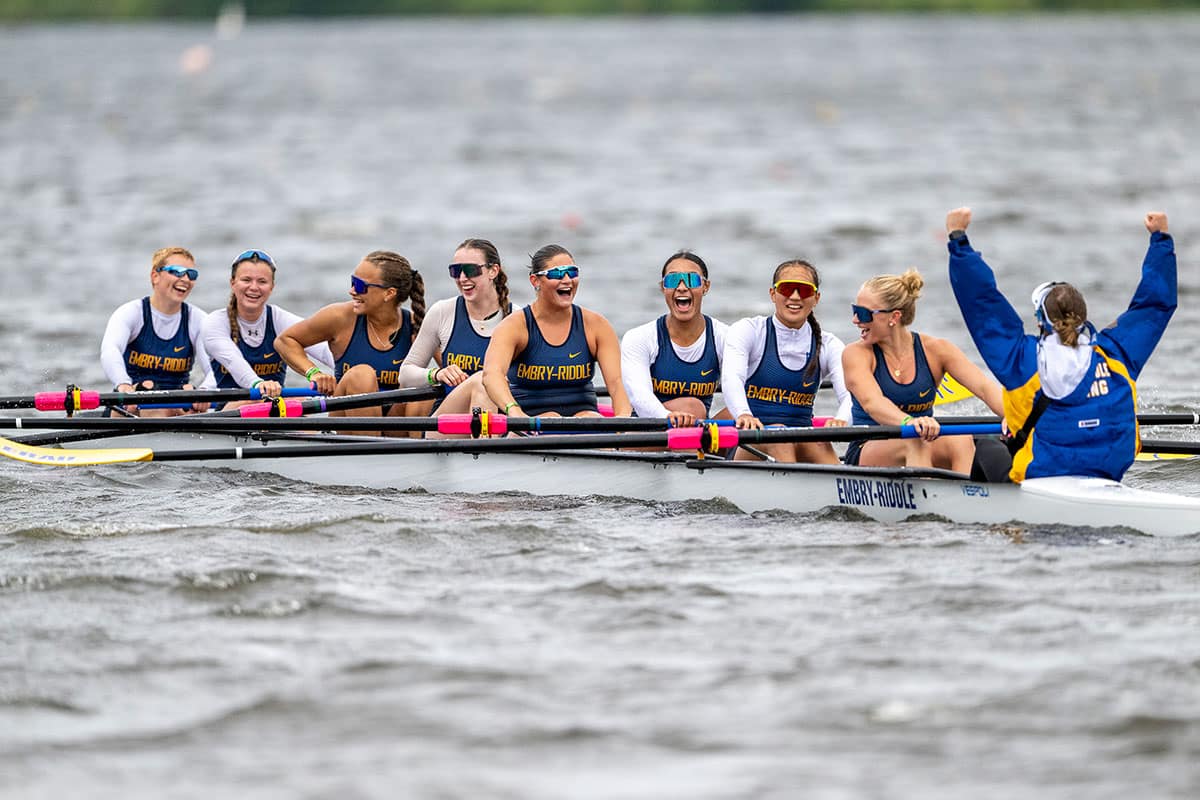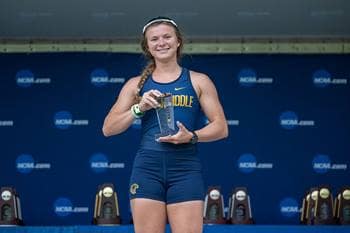Pulling Together: Embry-Riddle Women’s Rowing Wins Championship, Makes Program History

Throughout the year, the women’s rowing team at Embry-Riddle Aeronautical University recited four words before the end of their practices and competitions: “Last one, fast one.”
For the rowers, the mantra was a reminder that “this is our last race, so let’s make it our fastest,” said Jolee Paulk, the eight boat’s coxswain. “It was a reminder to hold yourself to that higher standard.”
And that’s the mindset the women took into the 2,000-meter Grand Final at the NCAA II Rowing Championships. The eight boat entered the race as the third seed, having qualified through the repechage heat, a last-chance heat for crews that did not qualify in the initial heats.
“We had already raced two times, so we’re more tired and we’re more fatigued,” recalled fifth-year rower Shelby Ernst. “But we had that mental toughness, knowing that we were fitter than we had ever been before.”
‘Go That Extra Mile’
Ernst had seen the team “through all its ups and downs,” she said, including missing out on the Grand Final in 2024. Embry-Riddle first fielded a rowing team seven years ago.
This year was different.
“I think we all just bought in this year and trusted in our coach,” she said. “I think that kind of catapulted us from prior years.”
The women began their training last August, waking up early, putting in extra practice and logging more meters. The crew came through the fall semester stronger after grueling 6,000-meter races. At Christmas, the coaches sent the team home with a training plan.
“We all agreed that we were going to go that extra mile over Christmas break; that we were going to submit to our workouts and hold each other accountable,” said Paulk, a rising junior majoring in Aeronautical Science.

Paulk, the eight boat’s coxswain, had never competed in rowing before joining Embry-Riddle’s women’s rowing team. (Photo: Ben Solomon/NCAA Photos via Getty Images)
As the coxswain, Paulk acts as a coach in the boat. She steers and executes race strategy while maintaining synchronization and motivating the rowers to pull harder. A four-sport athlete in high school, Paulk had never been part of a rowing team when she entered head coach Grant Maddock’s office two years ago. She joined as a walk-on.
“It was a big learning curve,” she said. “The girls never doubted, taking in someone who didn’t know anything. It was really a family.”
Ernst, who has been rowing for a decade, said she has had other coxswains but none like Paulk.
“She was the backbone of the team,” Ernst said. “She was very supportive. She knows what we go through, and she was there for us every single day.”
A Perfect End
At the beginning of the Grand Final, Ernst could feel the energy in the boat. “There wasn’t much pressure on us,” she said. “I was just really hopeful, and I wanted to have a great final race of my career.”
For the first 750 meters, Embry-Riddle’s eight boat trailed. But “no one gave up,” Paulk said, “even when we were losing by half a boat length.”
In the last 250 meters, the rowers started to pick up speed and gain ground on Western Washington, the leader. They dug in their oars and rowed in unison. “Everyone just started catching together and pulling as hard as they could,” Paulk said.

Soleil Edwards receives the NCAA's Elite 90 Award, which goes to the student-athlete with the highest cumulative GPA at the finals for each of the NCAA's 90 championships. (Photo: Ben Solomon/NCAA Photos via Getty Images)
With each stroke, the boat gained more ground. Paulk looked over and made eye contact with the Vikings’ coxswain.
“The last ten strokes we took together,” she said, “the boat was just moving perfectly.”
They surged to the finish flags. “As we crossed the line, everything went in slow motion,” Paulk said. “But I just knew we won.” They had — by eight-tenths of a second.
The win earned the team a maximum 18 points. After a weather-delayed start, Embry-Riddle’s four boat placed third in the Grand Final, adding another eight points for a total of 26. That clinched the national championship for the women’s rowing team, putting them two points ahead of runner-up Cal Poly Humboldt and five in front of Western Washington.
“This group has truly earned every moment of this national championship,” head coach Maddock said. “Two years ago, we made a deliberate choice to raise the bar by training harder and racing at a higher level. What we've accomplished is special, but it's just the beginning of what this team is capable of.”
The women made Embry-Riddle athletics history by becoming the first program in the university’s NCAA II era to win a team title. Rower Soleil Edwards, a rising senior majoring in Electrical Engineering, also became the first student-athlete in Embry-Riddle history to receive the NCAA's Elite 90 Award, which goes to the student-athlete with the highest cumulative GPA at the finals for each of the NCAA's 90 championships. The Collegiate Rowing Coaches Association named Sarah Kinlocke, a rising sophomore and Aeronautical Science major, as the Athlete of the Year for Division II.
“As a freshman, I didn't think this award was even in my reach,” Kinlocke said, “but it was possible thanks to my teammates and coaches.”
Ernst, who received her bachelor’s degree in Aerospace and Occupational Safety and has another year to go on her master’s degree in Aviation, is no longer eligible to compete. The race, she said, was the “perfect ending” to her university career.
“I couldn’t imagine doing it with a better group of girls,” she said. “And I hope the rowing team in the future just builds and builds."
